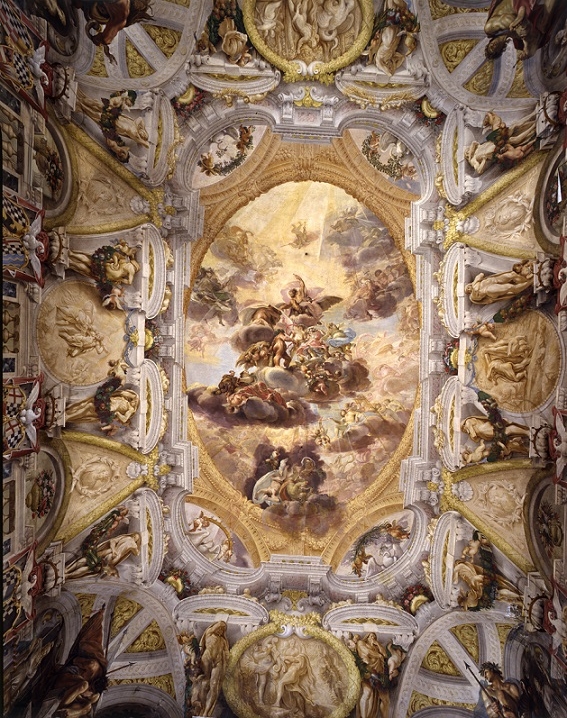The main hall was frescoed between 1669 and 1671 by Domenico Maria Canuti who, after the two ovals in the staircase made for Odoardo Pepoli, realised the large fresco with the Hercules Apotheosis together with the "quadraturista" (an expert specialising in pating the architectural scenes) Antonio Santi called the Mengazzino.
Hercules, the greek hero which was namesake of Odoardo's father and son, is depicted at the center of the vault being accepted in the Olympos by Jupiter, seated on an eagle at the presence of Eros and his wife Hebe, Goddess of Eternal Youth. Beside is Juno with her scepter and crown, while the other Gods are present in the shiny Sun chariot; under the hero, there are some allegorical figures, which represent virtues and vices; the Reason ruling the Strenght (a beast) and the Pride and Envy are the two women, the first young and beautiful, the other one older and with a greenish complexion, falling down. The scene is set in an open sky, beyond the rich "quadratura" (i.e. the architectural scene) painted by Mengazzino which expands the real architecture of the hall with a complex set of fake elements like ledges, banisters, arches, miches, columns and bas-reliefs, creating the illusion of the vault opening on an infinite space. The fake architecture is inhabited by atlantes supporting. In the four angles the are some nude giants (reminiscents of the famous Michelangelo's "ignudi" in the Sistine chapel). In the centre of each side the are four black and white ovals depicting some Hercules stories: Alcestis released from Ades, The Delphic Tripod Dispute, Hercules and the Cercopes, the Hesperides apples.
At the vault basis the Pepoli family coat-of-arms is coupled with that of various wifes of the family members, surmounted by a swan (one of the family symbols) and a metal crown (allusion at the title of Count received by the Odoardo branch). The coat-of-arms of the family is the black and white chessboard, which is reprised on the pavement, as a reference to the Family original occupation as moneychanger, the abacus chess being a medieval calculation instrument.








